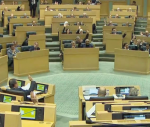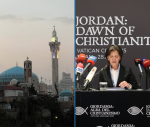You are here
Treachery is when the concept of social contract is distorted and problematised
Jul 14,2018 - Last updated at Jul 14,2018
When Prime Minister Omar Razzaz was first proposed to be head of the executive authority in Jordan, Jordanians circulated a paper he wrote back in 2013 entitled “The Treacherous Path Towards a New Arab Social Contract” and celebrated its analysis of the seven transformation factors that would bring about a new Arab order.
This soft spoken, mild mannered and highly educated intellectual, who is the son of a celebrated Arab politician whose life came to a tragic end prematurely and brother to a much-loved literary author and intellectual who also passed away early, had articulated the people’s aspirations into a value-laden, socioeconomic and political platform that put the livelihood and voice of the people ahead of the shrewd and survival-driven politicking of Arab regimes.
This was the stuff of Arab dreams.
Add to that the inspiring political context within which he was rising to power. Well organised, peaceful, and creative protests led by the middle class, women and youth of Jordan was understood and embraced by a pragmatic and tolerant political leadership and security apparatus, and gave birth to a new breed of politicians carrying transformative political and economic plans, empathy for the people, understanding of the geopolitical factors and a healthy respect for stability in Jordan. Most importantly, the new prime minister who promised change in “nahj”, understood and supported the continued primacy of the political contract between the Hashemite family and the people of Jordan as the non-negotiable ingredient of stability.
The euphoric mood of celebration, however, came to a quick halt when reality took over from dreamy aspirations and individual expectations. The government makeup did not match the people’s aspirations; statements by the new officials highlighted their limited experience in handling their public role and, therefore, raised concerns about their ability to deliver the ambitious programme associated with the appointment of Razzaz; and most recently last week, the speech to seek confidence reiterated the value system that the new premier carried but the practical “indicators of change” Jordanians wanted to be see confirmed within the 100 day plan promises, did not materialise.
At that moment of uncertainty and doubt, the detractors saw their moment. Rumours and whispers about the unacceptability of Razzaz’s promises of a “new” social contract started to leak through on public platforms. The political leaks argued that it was outside the mandate of the executive authority to draft a new social contract and therefore not his to discuss. The social contract in Jordan, they said, is one between the ruler and the ruled and, therefore, the government is only mandated to implement the tenets of that contract not dabble in drafting and editing it.
Critics quickly shifted their emphasis from the by now “insignificant details” of the viability of individual ministers and plans of action, to the more high-level, and politically loaded, questions about whether Razzaz is reaching beyond his mandate and whether his remarks and plans had the prior approval of the palace and the security apparatus, also a politically charged proposition.
This development is a significant one.
To explain, this narrative is meant as an intentional, and in my opinion underhanded, political challenge to the new premier, aimed at shaking his self-confidence, as well as trust in him, very early on by alluding to a contest over political mandate.
The Prime Ministry did not miss the trick or the obvious allusion in this criticism and issued a statement on Thursday last week in which it clarified: “The social contract that the government is working on drafting organises the relationship between the government and its citizens from the perspective of its citizen rights on the one hand and government responsibility on the other in improving the delivery of government services against the citizens’ contribution in helping shoulder the burdens.” Most critically the statement concluded: “The social contract is not linked to the Constitution or the bay’ah.”
I found it especially interesting that the Prime Ministry statement not only clarified the type of contract it is referring to and, therefore, situated it immediately within the recognised and uncontroversial responsibilities of the executive authority, but the statement also specifically articulated what the government is not claiming it to be. By locating the government social contract outside both a constitutional and Islamic (bay’ah) reference framework, the government specifically removed any ambiguity over crossing mandates and in the same breath reiterated and publicly underlined its allegiance to the Hashemite family that commands political legitimacy and leadership drawn from a political and social contract with the people of Jordan that is based in both the constitution of the state and the Islamic ancestry of the Hashemites.
It is also noteworthy that the government has, in the confidence speech and other statements, referenced His Majesty the late King Abdullah I, the visionary founder of Jordan, and His Majesty King Abdullah II’s discussion papers, as its inspiration for the social contract or ‘nahj” it envisions. Those references, as well as the reminder that Jordan is nearing its centennial anniversary, showcase this government’s political astuteness in recognising the Hashemite history and values that formed and continue to inform the country’s political path both internationally and globally. It is a statement that says that the social contract the government is considering already has the Hashemite seal of approval and draws its legitimacy from that higher contract that the ruler has with the ruled i.e specifically the contract King Abdullah, as a Hashemite ruler, has with the people of Jordan.
Having said that, round one of this challenge is not yet won. The “traditionalists” who stand to lose most from a government-led social contract that links government rewards and services to performance and “shouldering the burden” appear to be behind this not so innocent narrative against the premier. Their voices will certainly be heard during this week’s confidence speeches in Parliament and the drama acts, leaks and Tweets that will accompany many of their antics will certainly shake our confidence and test our confidence in the validity of installing new rules of engagement, a term I believe more accurately describes what the government is trying to achieve at least in the short term, between government and citizens.
To truly win, the government must get through, or even scrape through, the parliamentary confidence session next week. If it does, and hopefully it will, then the government must grab the opportunity of the next 100 days to show His Majesty that it was worthy of his confidence and the people that it was worthy of their hopes.
This step will require honing in the government public statements to showcase transparency but with strategic vision and away from unnecessary banter or showmanship. The government will be expected to show a greater focus on action and practical solutions rather than further discussion and apparently endless dialogue.
Finally, and in my opinion most importantly, the government must direct its institutions and key representatives to officially engage and embrace Parliament, local councils, political parties and civil society in order that they are provided with the free space to mature and contribute positively. These bodies must be aided, within an enabling and democratic environment, to regain their credibility and with it win back the respect of Jordanians as their political representatives.
This last step is the only way to marginalise detractors of democracy and put an end to the attempts at political sabotage such the one we saw this last week, where the concept of the government-proposed new social contract was intentionally distorted and problematised. Building viable democratic institutions and opening free speech spaces are the only routes to breeding the type of political dialogue we need: one that serves the interests of the country, its leadership and people.
Treachery may have been predicted by Razzaz in his paper on a new Arab social contract, but that does not mean that it cannot be curbed or even nipped at the bud.













